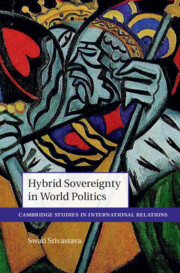‘The idea that sovereignty in the contemporary international system is an attribute of states is fundamental to much of international relations theory. In Hybrid Sovereignty in World Politics Swati Srivastava argues that the world is much more complicated than that. States and non-state actors are entangled in sovereign global politics in various ways, including contractually, institutionally, and performatively. Through case studies ranging from the English East India Company to Blackwater in the Iraq War, Srivastava provides fascinating historical illustrations of this important and timely argument.'
Samuel Barkin - University of Massachusetts Boston
‘Srivastava has written a fascinating and deeply historical rethinking of the meaning of sovereignty, its contingent and hybrid character, and the porous boundaries between public and private authorities. She uses disparate cases, from Blackwater to Amnesty, to demonstrate how seemingly private organizations produce sovereign power in the ambiguities and tensions of public/ private hybridity.’
Virginia Haufler - University of Maryland, College Park
‘A challenging and provocative read, this is a groundbreaking work that, by offering a novel perspective, is a major contribution to traditional scholarship on this subject … Highly recommended.’
D. Ettinger
Source: Choice
‘this book is a valuable contribution to the literature on the dynamics of sovereignty and governance. The framework introduced will be useful to anyone seeking to understand both how governments rally around the notion of sovereignty and how they govern in practice.’
Hilary Matfess
Source: International Affairs
‘… a rich and wide-ranging study that impressively deploys a range of qualitative and quantitative methods to explore the murky borders around sovereign functions in public and private spheres.’
Joel Ng
Source: Perspectives on Politics





